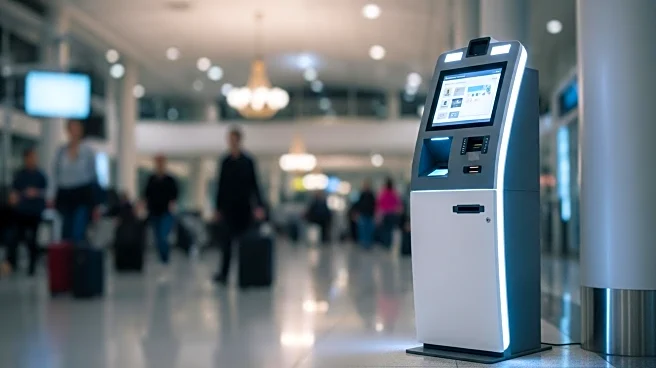What's Happening?
Chhatrapati Shivaji Maharaj International Airport (CSMIA) in Mumbai has experienced a significant increase in the adoption of self-service travel solutions over the past 16 months. The airport has implemented technology-enabled services such as self-check-in kiosks, self-baggage drop units, and biometric-enabled DigiYatra services. Between April 2024 and August 2025, over 3.86 million passengers utilized self-check-in kiosks, with domestic carriers like IndiGo, Air India, and Air India Express leading the usage. International airlines such as Air France, Emirates, and Lufthansa also saw substantial engagement. Additionally, the use of self-baggage drop machines has grown, processing over 7.15 lakh bags during the same period. The biometric-enabled DigiYatra services have shown the most significant growth, with 6.3 million passengers processed through e-gates and face pods. These advancements are supported by the airport's modernized Airport Operation Command Centre and AI-powered platforms.
Why It's Important?
The adoption of self-service travel solutions at Mumbai Airport represents a significant shift towards digital transformation in India's aviation sector. This move enhances operational efficiency and passenger convenience, allowing travelers to navigate airport processes more swiftly. The increased use of technology reduces wait times and streamlines operations, potentially setting a precedent for other airports in India and globally. Airlines benefit from improved passenger processing times, which can lead to increased customer satisfaction and loyalty. The integration of AI and predictive analytics further supports real-time operational efficiency, positioning Mumbai Airport as a leader in innovative airport management.
What's Next?
Mumbai Airport plans to continue its technological advancements by introducing smart washrooms and more AI-driven solutions across its terminals. The ongoing modernization efforts aim to further enhance passenger experience and operational efficiency. As the airport continues to lead in digital transformation, other airports may follow suit, adopting similar technologies to improve their services. The success of these initiatives could influence broader industry trends, encouraging more airports to invest in self-service and AI technologies.
Beyond the Headlines
The shift towards self-service travel solutions at Mumbai Airport highlights broader implications for the aviation industry, including ethical considerations around data privacy and security. As biometric data becomes integral to airport operations, ensuring robust data protection measures is crucial. Additionally, the increased reliance on technology raises questions about the future of human employment in airport operations, as automation may reduce the need for certain roles. These developments could lead to long-term shifts in workforce dynamics and require careful management to balance technological advancement with social responsibility.










